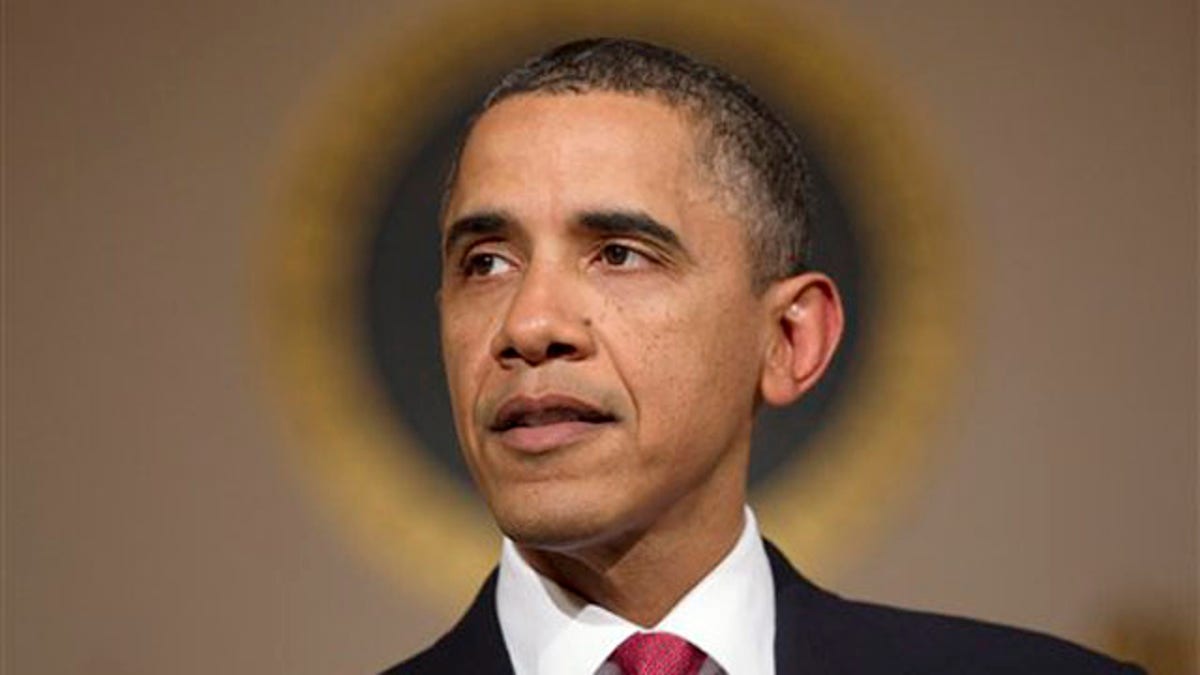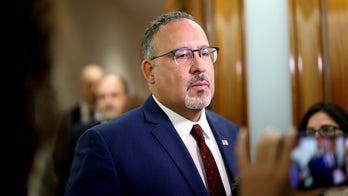
President Obama speaks about the situation in Egypt at the White House in Washington Feb. 1. (AP)
As resistance turns to revolt in the streets of Cairo, some are starting to question the Obama administration's handling of the unfolding crisis in the heart of America's most important Arab ally.
For the most part, President Obama's cautious, but firm, tone has won praise from lawmakers on both sides of the aisle. Though the Obama administration was clearly caught off guard by how quickly a regime's ouster in Tunisia inspired uprisings across Egypt and other Middle Eastern capitals, the president was applauded for striking a delicate balance.
He did not take sides from the outset, but at the same time also urged President Hosni Mubarak to fix the problems in his broken government. When the momentum shifted further away from Mubarak, so did Obama, telling the 30-year ruler it's time to step aside.
But something went wrong. Though Mubarak announced Tuesday night he would not seek re-election, the vigil-like scene from that night has given way to a bloody series of clashes between protesters and pro-government supporters.
Analysts and diplomats say the administration now must be even more cautious about what it says publicly, and they worry that the president may have slipped in the way he pushed for Mubarak's exit.
Elliott Abrams, a former George W. Bush adviser and fellow at the Council on Foreign Relations, said Obama appears to be taking partial credit for Mubarak's announcement by delivering a statement to the public Tuesday night. That, he said, was a mistake.
"I thought the president should not have spoken," Abrams said. "It was kind of unseemly, I thought."
John Bolton, former U.S. ambassador to the United Nations, similarly said the administration should fight the instinct to weigh in so publicly.
"I honestly wish we'd stop making statements," Bolton said. "I'm not saying do nothing. I'm just saying for God's sake, be careful."
The former ambassador said he's concerned the Obama administration may have "hardened" Mubarak's position by pushing him too far at once, speculating that the administration may have urged the Egyptian president to step down immediately, as opposed to waiting for his term to expire at the end of the year.
White House Press Secretary Robert Gibbs did not say Wednesday whether that was the case, only that Obama wants Egypt to start the transition process immediately.
"I think the people of Egypt need to see change, the people of Egypt need to see progress. And that's what the world needs to see," Gibbs said.
But Bolton said the administration's tough tone may have triggered a "counter-reaction," leading both sides to dig in their heels.
Former Arkansas Gov. Mike Huckabee, a former Republican presidential candidate, also told Fox News there is concern in Israel regarding "how quickly the Obama administration abandoned a 30-year ally."
At the same time, few want to see the administration disengaged, or living in the past, as Egypt prepares for a post-Mubarak era. Too much is on the line -- a peace treaty with Israel, Egypt's role in the Middle East peace process and its alliance with the West in a hostile region.
Sen. John McCain, R-Ariz., praised Obama for being proactive, saying he's "learned a lot" since the anti-government demonstrations in Iran in 2009, when the president's response was widely seen as too neutral.
Many are urging the administration to keep close ties with the Egyptian military, viewing that as the most stable, critical and lasting entity in the country.
But once again, Obama is left with no good options in the Middle East. And he's being pulled in multiple directions.
With Egyptian factions jockeying for a foothold in the next government, McCain told Fox News that Obama needs to raise a red flag about the Islamist tenets held by the country's most important opposition group, the Muslim Brotherhood. He said Mohamed ElBaradei, the former International Atomic Energy Agency head who returned to Egypt to rally the protesters, is "not a friend of the United States" and could emerge as a "figurehead" for the Brotherhood "since he has no real following."
But Bolton said calling out the Muslim Brotherhood would only give the group more standing.
And while Bolton said the administration should not be pushing for Mubarak to leave immediately, Abrams said they should be doing exactly that -- only behind the scenes, not in public. McCain also sent out a Tweet Wednesday saying the time has come for Mubarak to "relinquish power."
"I think by and large the administration has played this pretty well, but you're entering a period now in which our options are really diminishing," said Aaron David Miller, a former State Department analyst and fellow with the Woodrow Wilson International Center for Scholars.
As violence erupted in Egypt Wednesday, the Obama administration intensified its calls for restraint.
"If any of the violence is instigated by the government, it should stop immediately," Gibbs said Wednesday.
Gibbs did not elaborate on the administration's review of U.S. aid to Egypt. He said the administration's special envoy, Frank Wisner, is still in touch with all levels of the Egyptian government.
Cato Institute foreign policy analyst Malou Innocent suggested the administration is doing the best it can in a fluid situation. If anything, she said the U.S. government wasn't quick enough to voice support for the protesters. She, too, urged Obama to keep the Egyptian military close in the weeks and months ahead.
The dismantling of the Mubarak regime should teach the United States a lesson about the consequences of aligning too closely with problematic regimes, she added.
"It sort of reveals what a powder keg this region is and how unsustainable America's support for some of these regimes is," she said.




